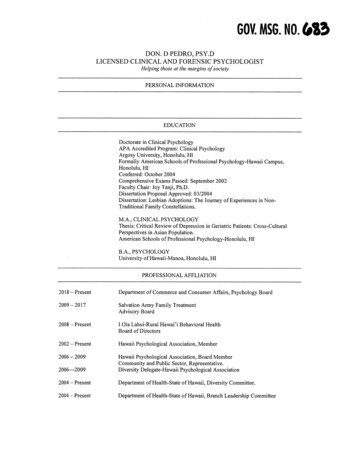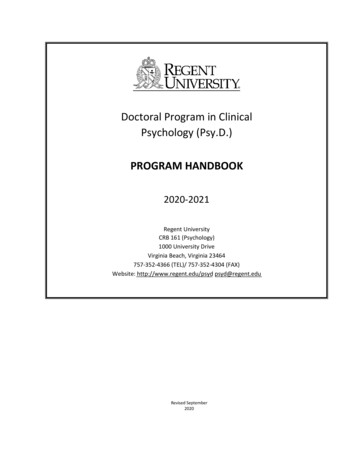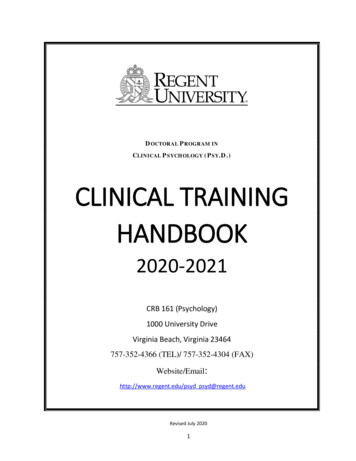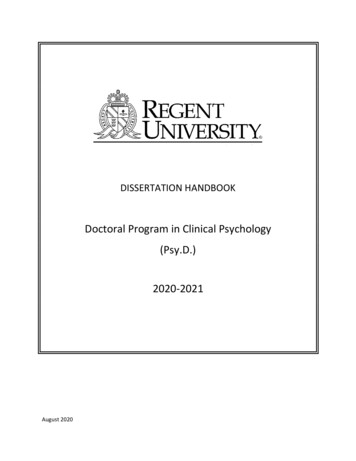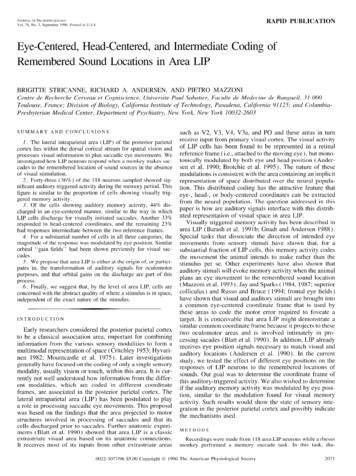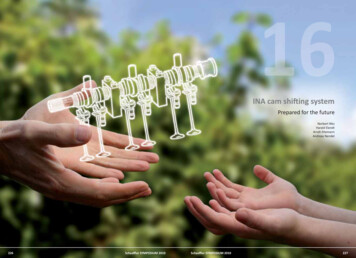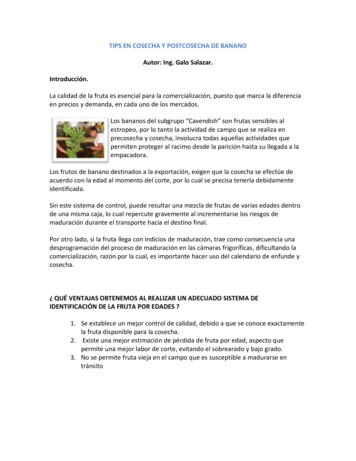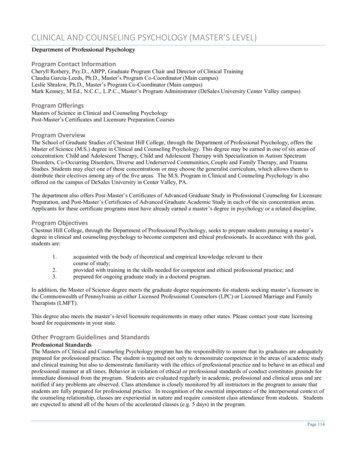
Transcription
CLINICAL AND COUNSELING PSYCHOLOGY (MASTER’S LEVEL)Department of Professional PsychologyProgram Contact InformationCheryll Rothery, Psy.D., ABPP, Graduate Program Chair and Director of Clinical TrainingClaudia Garcia-Leeds, Ph.D., Master’s Program Co-Coordinator (Main campus)Leslie Shralow, Ph.D., Master’s Program Co-Coordinator (Main campus)Mark Kenney, M.Ed., N.C.C., L.P.C., Master’s Program Administrator (DeSales University Center Valley campus)Program OfferingsMasters of Science in Clinical and Counseling PsychologyPost-Master’s Certificates and Licensure Preparation CoursesProgram OverviewThe School of Graduate Studies of Chestnut Hill College, through the Department of Professional Psychology, offers theMaster of Science (M.S.) degree in Clinical and Counseling Psychology. This degree may be earned in one of six areas ofconcentration: Child and Adolescent Therapy, Child and Adolescent Therapy with Specialization in Autism SpectrumDisorders, Co-Occurring Disorders, Diverse and Underserved Communities, Couple and Family Therapy, and TraumaStudies. Students may elect one of these concentrations or may choose the generalist curriculum, which allows them todistribute their electives among any of the five areas. The M.S. Program in Clinical and Counseling Psychology is alsooffered on the campus of DeSales University in Center Valley, PA.The department also offers Post-Master’s Certificates of Advanced Graduate Study in Professional Counseling for LicensurePreparation, and Post-Master’s Certificates of Advanced Graduate Academic Study in each of the six concentration areas.Applicants for these certificate programs must have already earned a master’s degree in psychology or a related discipline.Program ObjectivesChestnut Hill College, through the Department of Professional Psychology, seeks to prepare students pursuing a master’sdegree in clinical and counseling psychology to become competent and ethical professionals. In accordance with this goal,students are:1.2.3.acquainted with the body of theoretical and empirical knowledge relevant to theircourse of study;provided with training in the skills needed for competent and ethical professional practice; andprepared for ongoing graduate study in a doctoral program.In addition, the Master of Science degree meets the graduate degree requirements for students seeking master’s licensure inthe Commonwealth of Pennsylvania as either Licensed Professional Counselors (LPC) or Licensed Marriage and FamilyTherapists (LMFT).This degree also meets the master’s-level licensure requirements in many other states. Please contact your state licensingboard for requirements in your state.Other Program Guidelines and StandardsProfessional StandardsThe Masters of Clinical and Counseling Psychology program has the responsibility to assure that its graduates are adequatelyprepared for professional practice. The student is required not only to demonstrate competence in the areas of academic studyand clinical training but also to demonstrate familiarity with the ethics of professional practice and to behave in an ethical andprofessional manner at all times. Behavior in violation of ethical or professional standards of conduct constitutes grounds forimmediate dismissal from the program. Students are evaluated regularly in academic, professional and clinical areas and arenotified if any problems are observed. Class attendance is closely monitored by all instructors in the program to assure thatstudents are fully prepared for professional practice. In recognition of the essential importance of the interpersonal context ofthe counseling relationship, classes are experiential in nature and require consistent class attendance from students. Studentsare expected to attend all of the hours of the accelerated classes (e.g. 5 days) in the program.Page 114
Student Disclosure of Personal InformationThe following policies about student disclosure of personal information comply with the ACA Code of Ethics (2014) and theAPA Ethical Principles of Psychologists and Code of Conduct (APA, 2002).Disclosure in CoursesSome courses require students to share personal information, either orally or in writing, germane to understanding selfgrowth, developing insight into countertransference dynamics, or conducting effective treatment. This may include family oforigin issues and other personal information that could affect clinical and professional development.Disclosure in SupervisionStudents are required to share personal information with their supervisors germane to understanding self-growth, developinginsight into counter-transference dynamics, or conducting effective treatment. This may include family of origin issues,history of abuse or trauma, psychological treatment and other personal information that could affect clinical and professionaldevelopment.Professional Competence ProblemsThe faculty is responsible for determining whether each student’s emotional stability and interpersonal behavior are suitablefor a career in counseling and clinical psychology. If the student’s behavior warrants, it may be necessary for the faculty totake more immediate action. In most instances, the faculty will endeavor to discuss the issue with the student before takingfurther action. If the student’s behavior constitutes a breach of professional ethics, or the student’s behavior poses a seriousthreat to clients or to other students, or the student’s behavior significantly disrupts the learning process for other students, orthe student’s behavior interferes with their progress in the program, the student will be suspended or dismissed from theprogram.The faculty has the right and professional responsibility to obtain and evaluate personal information when students are unableto perform training or professionally related activities competently or pose a threat to themselves or others. To discharge thisduty, the faculty may require a student to undergo a psychological evaluation or participate in psychotherapy. The departmentmust approve the provider of these services in advance and the student is responsible for all fees associated with theevaluation and/or treatment. Refusal to participate in the mandated evaluation and/or treatment and/or refusal to authorizerelease of information from the evaluating or treating mental health professional constitutes grounds for immediatesuspension or dismissal from the program. The department will provide the student and the evaluator a list of questions forwhich answers are required.Program Completion InformationMaster of Science (M.S.) students must complete 60 graduate credits for graduation. Of these 60 credits, 27 credits (9courses) come from the Core Curriculum, and at least 9 credits come from the field placement for all students. LPC trackstudents take the 3 required Pennsylvania licensing courses. CFT students take an additional 6 elective credits (2 courses)beyond the credits required for the CFT concentration. Students without an undergraduate degree in psychology or closelyrelated field are evaluated on an individual basis. It is recommended that the non-psychology applicant has taken at least fourundergraduate psychology courses including: General Psychology, Abnormal Psychology, Statistics or Research Methods,and any other psychology course.Students may concentrate in one of six areas or take a generalist curriculum. These credits are distributed in the followingmanner: Co-Occurring Disorders: 12 concentration credits and 3 elective credits Child and Adolescent Therapy: 12 concentration credits and 3 elective credits Child and Adolescent Therapy with Autism Spectrum Disorder Specialization: 15 credits Couple and Family Therapy: 18 concentration credits and 6 elective credits Diverse and Underserved Communities: 15 concentration credits Trauma Studies: 12 concentration credits and 3 elective credits Generalist Curriculum: 15 credits selected from among any of the concentration or elective coursesStudents who need to take a third term of internship may do so in place of 3 elective credits.Page 115
These courses are required for all students. Prerequisites are in parentheses:CoreCoursesCompleteAllCourse CodePSYG 500PSYG 503PSYG 506PSYG 508PSYG 510PSYG 512PSYG 514PSYG 532PSYG 608Course NameTheories of Counseling and PsychotherapyPsychopathology (500, may be taken concurrently with 500)Techniques of Counseling and Psychotherapy I (503)Techniques of Counseling and Psychotherapy II (506)Research Design and MethodologyLegal and Ethical Issues in Counseling and Psychotherapy(500, 503)Development Across the Lifespan: Individual & FamilyThe Role of Culture & Gender in Counseling in PsychotherapyCouple and Family TherapyThese courses are required for LPC track students onlyCoursesComplete AllCourse CodePSYG 530PSYG 536PSYG 542Course NameGroup TherapyPsychological Assessment (500 and 503)Career Development and CounselingCouple and Family Therapy (18 CFT credits required, plus choice of 6 elective credits)Course CodePSYG 612ConcentrationCoursesPSYG 614PSYG 616CompleteSix coursesPSYG 618PSYG 604PSYG 638PSYG 682Course NameAdvanced Theories of Couple and Family Therapy (608)(required)Couple and Family Therapy Techniques (608,612)Advanced Couple and Family Therapy Techniques(608, 612,614)Human Sexuality and MarriageA Systemic Approach to the Problems of Adolescents(514, 608)**Systemic Treatment of Addictions (608)**Working with Latino Families (608)****Students choose two of these three coursesChild and Adolescent Therapy (12 credits required, plus 3 elective credits)ConcentrationCoursesComplete allcoursesCourse CodePSYG 602PSYG 604PSYG 622PSYG 662Course NamePlay Therapy (500, 514)A Systemic Approach to the Problems of Adolescents(514, 608)Intro to the Assessment and Treatment of PsychologicalTraumaAssessment and Treatment of Children and Adolescents (514)Page 116
Child and Adolescent Therapy with Autism Spectrum Disorder Specialization (15 credits required)ConcentrationCoursesComplete allcoursesCourse CodePSYG 602PSYG 604PSYG 652PSYG 654PSYG 662Course NamePlay Therapy (500, 514)A Systemic Approach to the Problems of Adolescents(514, 608)Introduction to Autism Spectrum Disorders*Treatment Approaches to Autism Spectrum Disorders (652)*Assessment and Treatment of Children and Adolescents (514)*Note: Available at Main Campus OnlyCo-Occurring Disorders (12 credits required, plus choice of 3 elective credits)ConcentrationCoursesComplete allcoursesCourse CodePSYG 622PSYG 630Course NameIntroduction to the Assessment and Treatment of PsychologicalTraumaFoundations of Addictive BehaviorsPSYG 638PSYG 672Systemic Treatment of Addictions (608, 630)Assessment and Treatment of Co-Occurring disorders (630)Diverse and Underserved Communities (6 required credits, 9 diversity elective credits)Course CodeCourse NameRequired CoursesPSYG 622PSYG 630ConcentrationCoursesIntroduction to the Assessment & Treatment ofPsychological TraumaFoundations of Addictive BehaviorDiversity Elective Courses (select 3 courses)PSYG 652PSYG 640PSYG 684PSYG 682PSYG 680PSYG 561/562PSYG 628PSYG 635Introduction to Autism Spectrum DisordersCompetencies for LGBTQ CounselingMindfulness and PsychotherapyWorking with Latino FamiliesIntroduction to GeropsychologyIndependent Research in Clinical and Counseling PsychologyWorking Effectively in Trauma- Intensive CommunitiesSpecial Topics in Diversity (e.g. Working with AfricanAmerican communities, Working with Asian AmericanCommunities, Counseling Multiracial Populations)Trauma Studies (12 credits required, plus choice of 3 elective credits)ConcentrationCoursesComplete allcoursesCourse CodePSYG 622PSYG 624PSYG 628PSYG 675Course NameIntroduction to the Assessment and Treatment of PsychologicalTraumaTreatment of Complex Chronic Trauma Responses (622)Working Effectively in Trauma-Intensive Communities (622)Advanced Techniques in Trauma Intervention (622)Page 117
Electives (note: students may also use concentration courses to fulfill elective requirements)ElectivesCourse CodePSYG 544PSYG 546PSYG 645PSYG 561PSYG 562Course NameEating DisordersBereavement CounselingSpecial TopicsIndependent Study I (510)Independent Study II (561)Field Experience (see below for prerequisites)FieldExperienceCourse CodePSYG 705PSYG 710PSYG 715PSYG 725PSYG 735Course NamePracticum (except for MFT students)MFT Internship IInternship I (LPC Students)Internship IIInternship III (optional except for MFT students)Students in the MFT concentration take 710, 725, and 735 and do not take 705.All other students must take 705 first and then 715 and 725.Students may also opt to take 735 if needed.PracticumThe practicum is mandatory for students seeking licensure as Licensed Professional Counselors (LPC) in Pennsylvania. Thepracticum is a 100-hour experience that includes 6-7 hours per week at the practicum site, plus 1.5 hours of classroomsupervision weekly. Content for the practicum experience includes biopsychosocial assessment, case formulation, diagnosis,and treatment planning. Students may engage in: milieu therapy, group therapy co-facilitation, case conferences, educationalexperiences, and individual therapy and group therapy as considered appropriate by the site supervisor. The overall goal ofthe practicum is preparation for internship. Because of the requirements of our various sites, practicum can begin only duringthe fall or summer sessions. Please plan accordingly. Consult with your advisor or the Coordinator of Master’s FieldPlacements if you have any questions.Practicum and CFT Internship 1 Prerequisites Theories of Counseling and Psychotherapy Psychopathology Techniques of Counseling and Psychotherapy I Legal & Ethical IssuesLPC students typically continue with internship PSYG 715 immediately after the practicum. CFT students must continueimmediately to PSYG 725 Internship 2 after Internship 1 semester. Please be sure you have completed enough coursework tobe able to continue on in your field placement.InternshipStudents accept the responsibility of applying and interviewing for their internship. A detailed procedure for this process ispresented at the internship information sessions that students are required to attend. Please contact the co-Coordinator ofMasters Field Placements, for dates and times of these sessions.Internship PrerequisitesPrior to registering for second semester of field placement (PSYG 715 for LPC; PSYG 725 for CFT), students must havesuccessfully completed a minimum of 30 credits including all of the following courses: Theories of Counseling and Psychotherapy Psychopathology Techniques of Counseling and Psychotherapy I Techniques of Counseling and Psychotherapy II (May be taken concurrently with the first semester of fieldPage 118
placement)Legal and Ethical IssuesPracticum (PSYG 705) or MFT Internship I (PSYG 710) for Couple and Family Therapy students onlyTwo Concentration Courses (students in the generalist curriculum may use any two non-core courses) Important Procedures/Policies (in preparation for practicum/internship)1. Contact the Coordinator of Master’s Field Placements to attend an information session for practicum/internship.You are required to attend an information session two terms prior to the term you plan to begin. Group informationsessions will be held each term. Students may begin the practicum/internship sequence in the summer or fall termsonly.2. A practicum/internship resource list is available to students after attending an information session. The Coordinatorof Field Placements has a resource book containing a listing of previously used sites and information regarding thesites. Students may also seek new practicum/internship placements. However, the Coordinator of Master’s FieldPlacements, consistent with program policies, must approve all sites.3. Prepare a resume/vita, as you will need it to interview for practicum/internship. All other paperwork necessary forthe interview process will be distributed at the practicum/internship information sessions.4. Once you have decided on a site, you are responsible for arranging for and delivering completed paperwork to theCoordinator of Master’s Field Placements. As part of the practicum/internship process all students are required toprocure liability insurance. Students are not permitted to begin a practicum or internship without liabilityinsurance and must maintain it until the internship is completed. Students are required to submitverification of coverage to both the Coordinator of Master’s Field Placements and the field sitesupervisor.5. A practicum or internship may not be completed at a site where the student is or has been employed in the previousthree years.6. All students are required to participate in a group supervision class each term of their practicum/internship. You mayregister at the beginning of each term for one of the practicum or internship classes upon approval by theCoordinator of the Master’s Field Placements.Internship RequirementsDuring the actual internship placement students must meet the following requirements:1.2.3.4.Students interested in seeking LPC licensure must train at the field site a minimum of 700 hours over a minimum ofthree terms, including the practicum semester and two semesters of internship. Of these 700 hours, 240 must bespent in direct-client contact. Students seeking LMFT licensure must complete a total of 300 direct-client contacthours over the course of a full calendar year (3 terms) and a total of 700 hours at the internship site.Students must attend a weekly seminar at the College. The seminar will provide an opportunity for students todiscuss cases and their internship experience. (Note: Students must register for the corresponding seminar for eachterm of Internship: PSYG 705 or 710, PSYG 715, PSYG 725, PSYG 735.)Final grades are globally based on regular attendance and participation in the weekly seminar, performance at theinternship site and in the course, the timely submission of required paperwork, and the site supervisor’s writtenevaluation.All students are expected to comply with the rules and regulations of the internship site and conduct themselves in aprofessional manner at all times.Suspension/Termination of Field ExperienceIn extreme cases, the Internship or Practicum Site Supervisor or the CHC Internship or Practicum Group Supervisor maysuspend a student’s internship or practicum, while circumstances are being reviewed by the Coordinator of Master’s FieldPlacements. The length of a suspension is determined by the nature of the situation. Every effort is made to expedite theprocess in the best interest of the student and clients involved.A student’s practicum or internship may be terminated prior to completion by either the Site Supervisor or the Coordinator ofField Placements if the student’s performance is considered inadequate, unethical, or in violation of the program policies asstated in the catalog and/or the Practicum/Internship Handbook. Termination of a practicum or internship based on studentperformance constitutes grounds for dismissal from the program. The Co-Coordinators of the Master’s Program mustrecommend dismissal to the Chair of the Department of Professional Psychology and the Dean of the School of GraduateStudies. Supporting documentation stating the reason(s) for dismissal is to be provided, in writing, to the student, the Chair,and the Dean.Page 119
If a student is terminated from a practicum or internship and consequently terminated from the College, the student may,within ten days of the College’s termination, appeal to the Dean of the School of Graduate Studies, stating the reasons fordisagreement with termination from the College and presenting evidence in support of the appeal. After appropriateconsultation, the Dean of the School of Graduate Studies will provide a final decision to the student.It is very important to note that more in-depth information concerning termination policies, the appealsprocedure, and th
Masters of Science in Clinical and Counseling Psychology . offered on the campus of DeSales University in Center Valley, PA. . Applicants for these certificate programs must have already earned a master’s degree in psychology or a related discipline. Program Objectives
